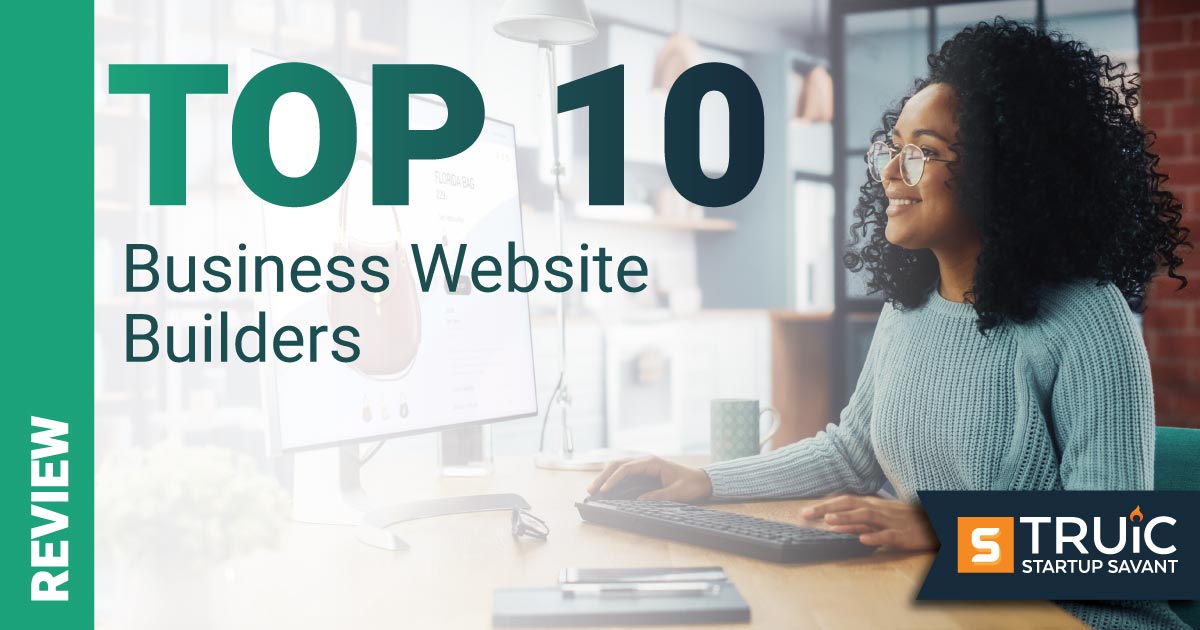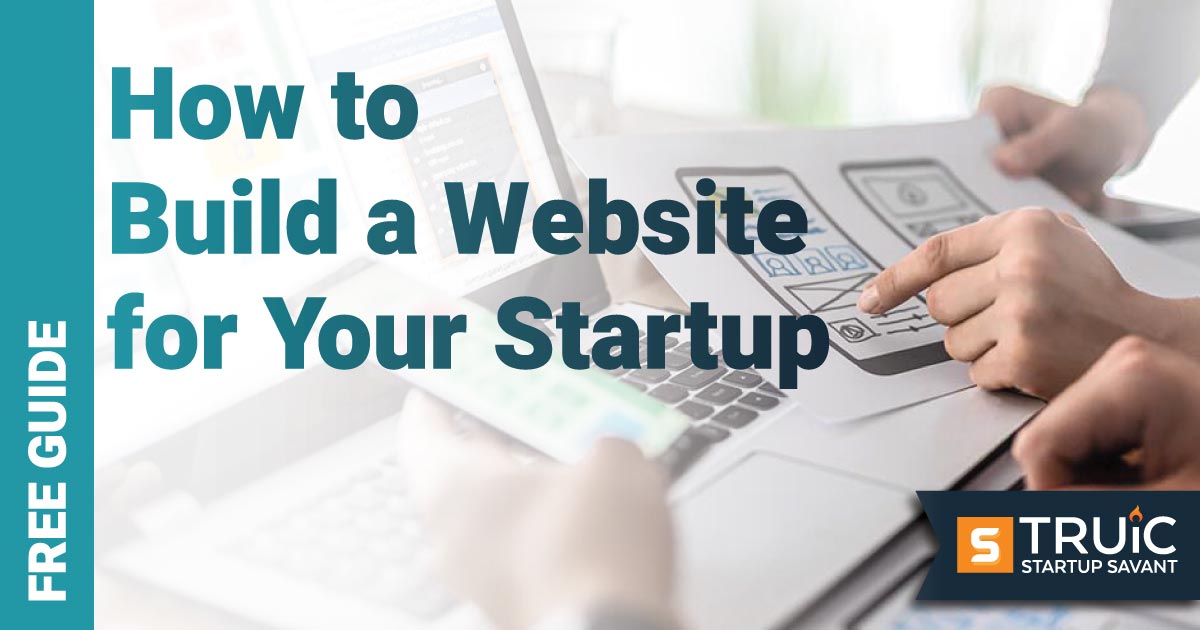10 Best Website Builders for Startups in 2024

Last Updated: By TRUiC Team
Starting a new business is an exciting yet challenging time. And with limited time and resources, choosing the right website builder can fall down the priority list. However, an online presence is crucial for reaching customers and establishing credibility.
In this review, we researched the best website builders for small businesses and startups. We prioritized reasonable pricing, simplicity, scalability, ecommerce capabilities, and more. Whether you need to quickly launch an informational site or build a full-fledged online store, there's a website builder here that can meet your needs.
Recommended: Create a professional startup website in minutes with GoDaddy’s easy drag-and-drop editor. Try it for free today.
Best Website Builder Software in 2024
|
GoDaddy 4.8/5 |
BEST WEBSITE BUILDER OVERALL
|
VISIT SITE |
|
Hostinger 4.6/5 |
|
|
|
Wix 4.4/5 |
|
VISIT SITE |
|
Shopify 4.3/5 |
|
VISIT SITE |
|
WordPress 4.1/5 |
|
VISIT SITE |
Entrepreneurs need a startup website to establish their online presence, attract customers, and build credibility.
As a founder, you need a website builder that's affordable, easy to use, and suited for startups. It should have polished templates and customization to showcase your brand since your site is likely the first impression potential clients will have.
Below, we'll compare the features, pros and cons, and costs of the top business website builder of 2024 to see which is the right one for you.
10 Best Website Builders of 2024:
- GoDaddy - Best Website Builder Overall
- Hostinger - Best Marketing Integrations
- Wix - Great for Creatives
- Shopify - Best Ecommerce Website Builder
- WordPress - Ideal for Customization
- Web.com - Best Included Services
- Weebly - Great for Startups on a Budget
- Squarespace - Best for Design
- Webflow - Best Free Plan
- Duda - Ideal for Agencies
In terms of simple and straightforward design, GoDaddy is the overall best website builder platform for startups. This tool has an extensive suite of features to help almost any business grow and scale alongside its professional website. Paid plans for GoDaddy start at $9.99 per month and come with 24/7 customer support.
Get to know each of the top choices for startup website builders below. By the end of our comparison, you'll be able to choose which one is best for you and your company.
Best Startup Website Builder: GoDaddy
With a simple interface and intuitive design, GoDaddy is our top choice for any startup or business owner looking to build a website without overpaying or over-complicating things. TRUiC readers receive a discount on any GoDaddy plan of their choice by clicking the button below.
1. GoDaddy
Pricing: Free–$29.99 per month billed annually
Our top recommendation for startups looking to build a professional, polished website is GoDaddy. Their AI-powered website builder is perfect for entrepreneurs who want a hassle-free, quick, and customizable online presence. Whether you're looking to showcase a portfolio, set up an online store, or simply inform visitors about your startup, GoDaddy offers an excellent solution.

Pros
- Extremely easy-to-use drag-and-drop editor requires no coding skills
- Includes hundreds of professional, industry-specific templates to choose from
- Built-in marketing and SEO tools like email marketing and social media scheduling help promote your new business
- Round-the-clock, 24/7 customer support to assist anytime
- Free SSL certificate ensures your site's data stays secure
Cons
- Limited customization options since the templates and layouts are pre-designed
- Ecommerce capabilities are not as robust as other website builders on the market
Notable Features
- Build, Promote, Monitor, and More: Seamless integration of various tools designed for end-to-end website management.
- Mobile Design and Editing: Edit on the go, ensuring your site looks impeccable on any device.
- Ecommerce Features: Flexible payment options, product synchronization with marketplaces like Amazon and Etsy, and more.
- Content Creation With GoDaddy Studio: Create stunning content with the aid of designer templates, fonts, and graphics.
- Promo Banners and Contact Forms: Engage visitors with promotions and easy communication channels.
Overall, GoDaddy makes it simple for startup founders and small business owners to get an affordable, high-quality website up and running fast. While you may need to upgrade to premium features as your business grows, the free website builder is a great way to launch your online presence without a big investment.
Build your online presence quickly and affordably with GoDaddy’s website builder tailored for startups.
Learn more by reading our full GoDaddy review.
2. Hostinger
Pricing: $2.99–$11.99 per month ($6.99-$19.99 upon renewal)
Hostinger steps up as an affordable web hosting platform that also incorporates the power of AI, ensuring entrepreneurs get their online presence up and running in a breeze. It’s not just about the affordability; the features they offer through their website builder, especially for startups, are nothing short of impressive.

Pros
- Intuitive drag-and-drop editor for easy site-building
- Affordable pricing starts at just $2.99/month
- Built-in SEO tools like meta tag editor and site analytics
- Free domain name registration included in the first year
Cons
- You might need to pay extra to remove Hostinger ads from your site
- Some users have reported slower page load times
Notable Features
- AI Site Builder: An intuitive tool that can get a site live in mere clicks.
- 150+ Customizable Templates: For a range of uses from blogs to business sites.
- Seamless eCommerce Tools: From product listings to checkouts, it’s all streamlined.
- Live Support: Round-the-clock assistance with multilingual agents.
- Integrated Marketing: Tools to chat directly with customers, display targeted ads, and analyze site data.
Hostinger website builder provides a powerful combo of affordability and innovation with its AI-driven tool. For startups looking to get a solid start without breaking the bank, this platform can be an ideal choice.
Just bear in mind the potential limitations in design and the possible need to address ads. Yet, with a 30-day money-back guarantee, testing the waters with Hostinger is practically risk-free.
Transform your startup idea into a stunning website with Hostinger today.
3. Wix
Pricing: $16–$159 per month (Custom enterprise pricing available)
If you or your business leans into the creative field, Wix will help you design your startup website the way you want, without coding knowledge. The platform provides helpful market analysis tools, inventory management tools, and plenty of storage space for audio, video, images, or any other content your website might require. With Wix, you can also benefit from scheduling and secure transaction features, and they provide 24/7 customer support.

Pros
- 24/7 user data protection and high website performance
- Access to over 900 free, strategically researched, and industry-tailored website templates.
- Accessibility tools to ensure your website is inclusive and user-friendly for all
- Over 1,000 advanced design capabilities, allowing users to truly customize their online presence
Cons
- Steep learning curve
- Can get expensive for advanced features
Notable Features
- Multi-cloud Hosting: Guarantees consistent online presence with a 99.9% uptime, ensuring reliability even during heavy traffic surges.
- Powerful Ecommerce Solutions: A holistic set of tools designed to empower businesses to establish and manage online stores with ease.
- Wix Owner App: A mobile solution for on-the-go business management, with synchronized data to provide a seamless experience across devices.
- Custom Branding Tools: Enables businesses to establish a memorable brand identity with customizable logos, color themes, and text styles.
Whether you're looking to create a website for your online store or need a great builder to help you showcase your portfolio, Wix is a great choice for many small businesses and startups. Wix is an attractive platform with professional plans starting at $14 per month.
See if Wix is the right fit for your startup website by reading our in-depth Wix Review, then try Wix for free when you're ready to get started.
4. Shopify
Pricing: $29–$299 per month billed annually
Shopify is a leading ecommerce platform designed for businesses of all sizes. Its comprehensive toolset, ranging from customizable themes to integrated point-of-sale systems, enables users to create online stores tailored to their brand's aesthetic and functional needs.

Pros
- With thousands of themes, users have the autonomy to design a store that mirrors their brand
- Aids in domain name generation and direct purchase, centralizing the business platform
- Level 1 PCI DSS compliant, ensuring secure financial transactions, and provides fraud analysis
- Versatile ecommerce features, from a seamless integration of online and offline sales with POS to real-time synchronized inventory management
Cons
- The use of multiple apps or advanced features might increase monthly expenses.
Notable Features
- Unlimited Product Listings: Allows businesses to host an extensive range of products without constraints.
- Comprehensive Dashboard: An insightful overview of sales, orders, and other vital metrics.
- Built-in SEO and Marketing: Integrated SEO tools that support promotions on major platforms like Google and Facebook.
- Shopify App Store: A rich ecosystem of apps, such as Shopify Search & Discovery, enhancing store functionality and user experience.
- Custom Content Through Metafields: Provides specialized information offerings, from ingredient lists to sustainability facts.
Shopify's strength lies in its comprehensive ecommerce features, tailored for all, from novices to tech-savvy entrepreneurs. Its emphasis on customization, combined with robust sales and marketing tools, positions Shopify as a leader in the ecommerce platform space.
To learn more about what Shopify can do for your ecommerce startup, check out our Shopify Review. If you're ready to begin setting up your online store, get started with Shopify free trial.
5. WordPress
Pricing: Free–$49 per month billed annually (Custom pricing available)
As a content management system (CMS), WordPress isn’t technically a website builder, but there are a number of tools that can provide a drag-and-drop experience. That being said, WordPress does have the steepest learning curve among all the website builders on this list. For this reason, we recommend choosing WordPress if you’re technically savvy and want complete control over your site.
There are some other limitations to WordPress. For starters, you will need to find a reliable web host to be able to publish your website. Then, some of the premium themes and plugins can come at quite a steep cost. However, outside of these, WordPress allows you to create and scale your website to your exact specifications.
Recommended Web Host: Bluehost

Pros
- Access to thousands of plugins and themes to help customize any site and add functionality.
- Integrations with WooCommerce, Shopify, HubSpot, and many other popular business management and growth services.
- Highly flexible and adaptable platform can be used for all types of websites, from personal blogs to large business sites
Cons
- Can require technical knowledge for advanced customization
- Hosting requires manual updates and maintenance
Notable Features
- Intuitive drag and drop builder with block editor - Easily build pages and rearrange content without coding.
- Marketing tools - Build mailing lists, promote content on social media, accept reviews and leverage other tools.
- Built-in SEO tools - Optimize sites for search with custom titles, meta descriptions, clean URLs and more.
- Real-time backups - Automatic backups ensure nothing gets lost. One-click restore capability available.
WordPress can be an ideal content management system for a variety of small business owners with a technical background. Sites built on this platform have the potential to be fast – many themes are mobile-ready, and hosting plans through Bluehost start at just $2.95 per month.
Be sure to read our full WordPress Review to see why we recommend it for tech startups. Then, get started building and hosting your WordPress site with Bluehost.
6. Web.com
Pricing: $1.95–$3.95 per month (first month offer)
Web.com is a comprehensive digital solution tailored to support businesses of various scales, recognizing the distinct needs of each enterprise. Their platform is flexible, offering both DIY tools for those who prefer hands-on website creation and professional services. With a suite of options ranging from ecommerce integration to AI-enhanced copywriting, Web.com equips businesses to establish, grow, and optimize their online presence.

Pros
- In-house team of designers and copywriters for those who seek professional assistance
- With domain name registration, SSL certification, and built-in hosting, it's a one-stop-shop for all website needs
- Offers tools to transform a simple website into an online store, even extending its reach to platforms like Facebook and Amazon
Cons
- Though they have a variety, some of the more sophisticated designs might not be available for free.
- There might be attempts to upsell additional services or features.
Notable Features
- Templates & Design: Access industry-centric designs, utilize 2 million free stock images, and incorporate elements like galleries, forms, and banners to make your site distinct.
- Domain & Security: Secure a unique domain name free for the first year and ensure your visitors' data safety with an SSL certificate.
- Appointment Scheduling: Streamline your booking process by setting custom policies and integrating services directly onto your website.
- AI-Powered Copywriting: Boost your site's content with AI-driven, SEO-friendly articles, social media posts, and more.
Web.com stands out as a holistic platform tailored for diverse business needs. Whether you're a novice building your first website or an established business aiming for a digital overhaul, this platform offers the tools and services to get you there.
7. Weebly
Pricing: Free–$26 per month billed annually
Weebly is a comprehensive website and eCommerce platform, rooted in the belief that entrepreneurial ambitions should be supported at every phase – from inception and launch to scaling up. It's a go-to for both budding online startups and traditional businesses transitioning to the digital space.

Pros
- Offers dynamic elements like parallax & reveal, video backgrounds, and custom fonts.
- Beyond basic customization, users can delve deeper with custom HTML/CSS & JavaScript.
- As part of Square's commerce suite, Weebly not only simplifies online selling but also in-person sales.
- From security, hosting, and SSL certifications to domain management and email marketing, Weebly streamlines website administration.
Cons
- Novice users might find the platform slightly overwhelming initially.
Notable Features
- Integrated Analytics: Empower decision-making with insightful data on website performance and user interactions.
- Mobile Apps: Stay connected on the go. Monitor performance, engage with visitors, and manage your site directly from mobile devices.
- Digital Marketing Suite: Boost website visibility with integrated social media marketing, SEO tools, and AdWords credit.
- Website-Building Community & Support: A robust community coupled with 24/7 email & chat support ensures users are never alone in their digital journey.
Weebly sets itself apart with its diverse web-building toolkit. It combines design options with practical marketing tools, making it a solid choice for businesses seeking a comprehensive platform without the fuss.
8. Squarespace
Pricing: $16–$49 per month billed annually
Rather than a quick DIY builder, Squarespace better serves growing startups wanting a polished online presence that matches their brand aesthetic. The elegant templates and customization options allow you to build stunning websites that don't look cookie-cutter. And with its integrated ecommerce features, Squarespace provides an all-in-one solution to not only create your site, but also run your online business.

Pros
- Offers a free trial, allowing users to test the platform without any financial commitment.
- Comprehensive ecommerce tools tailored for various business needs.
- Choose from industry-leading website templates, designer fonts, and color schemes
- On-brand email campaigns and versatile social tools.
Cons
- More expensive compared to other website builders
Notable Features
- Member Areas: Monetize and manage your online community effectively, offering exclusive content from virtual classes to newsletters.
- Unfold App: Enhance your social media presence with professional-looking content, featuring a vast array of templates, filters, and animations.
- Integrated App Ecosystem: Sync popular apps effortlessly, centralizing essential business tools.
- In-Depth Traffic Insights: Understand your website's traffic sources, the most engaged content, and geographical visitor distribution.
Squarespace combines aesthetics with robust functionality, offering a streamlined digital experience. Whether testing the waters with its free trial or diving deep into its offerings, it's a solid choice for those prioritizing design and operational efficiency.
9. Webflow
Pricing: Free–$39 per month billed annually (Custom pricing available)
Webflow provides a unique blend of visual design with the intricacies of coding, without requiring users to write any actual code. By translating visual designs directly into clean, semantic code, Webflow streamlines the web development process, making it accessible for both seasoned designers and beginners.

Pros
- Free website builder through their Starter plan
- Construct, roll out, and modify sites quickly
- You can choose between direct web publishing or exporting clean, development-ready code
- Allows seamless integration of advanced animations and interactions, including Lottie file support
Cons
- The variety of choices may be overwhelming for users accustomed to simpler platforms.
Notable Features
- Unified Designer Interface: Seamlessly integrate CSS, HTML, and JavaScript capabilities on a singular visual platform.
- Customizable Content: Define and design content structures tailored to specific needs with the Webflow CMS.
- Visually-Driven Ecommerce: Design online stores visually, eliminating the need for traditional templates and coding.
- Enhanced User Engagement: From gated content to direct on-page content edits, Webflow prioritizes user interaction.
- SEO & Hosting Perks: Leverage the in-built SEO tools and avail swift, reliable web hosting services.
By bridging the gap between design and code, Webflow ensures that professionals can focus on creating optimal web experiences without the technical hurdles.
10. Duda
Pricing: $19–$149 per month billed annually
Duda is a professional website builder designed for agencies and SaaS companies. With robust SEO, customization, and white-label capabilities, the software aims to provide everything you need to build high-quality, optimized websites tailored for each client at scale. While suitable for some startups, Duda's advanced suite of features caters more towards established firms looking to streamline their workflow and expand their services.

Pros
- Stable platform with a 99.9% uptime guarantee, ensuring your sites remain accessible and secure.
- Simplified creation and updating of multiple-page websites with the Dynamic Pages feature.
- Offer clients instant website generation, ideal for immediate PPC campaigns or interactive demos.
Cons
- May not offer the deep customization some advanced users require without delving into code.
Notable Features
- Rich Design Options: With the DudaFlex editor, users can achieve responsive and pixel-perfect designs while also leveraging an extensive library of pre-designed templates.
- White-Label Capabilities: Offer a fully branded experience to clients, inclusive of customized emails and support portals.
- Efficient Management: The centralized dashboard streamlines client management, site duplication, and domain oversight.
- Client Billing: Directly handle and streamline client billing from within the platform, ensuring timely payments without added costs.
Overall, Duda is a scalable website builder for agencies and SaaS startups wanting to expand their services and build professional-grade websites tailored to each client.
Which Website Builder is Best?
At the end of the day, it's up to you to choose which website builder is right for your startup. Be sure to read our individual reviews for each website builder to get a better understanding of what comes with these platforms.
After extensive research, we definitely prefer GoDaddy. Between the low prices, included features, and ease of use, we think GoDaddy is a great choice for any entrepreneur looking to build a strong website. Plus, TRUiC readers receive an additional discount when they sign up for GoDaddy.
How to Choose the Best Website Builder
Choosing the right website builder for your startup is a critical decision, as the digital presence you establish will often serve as the first impression for potential clients or customers. It's essential to find a platform that aligns with your startup's goals, technical abilities, and budget. Here's a step-by-step guide to assist startup founders in making the right choice:
Define Your Needs
Before diving into the myriad of options, clearly outline what you need from a website builder. Are you creating an ecommerce store, a blog, a portfolio, or perhaps a landing page? The purpose of your website will heavily influence the features you need.
Evaluate Your Technical Expertise
While many website builders are designed for those with minimal technical knowledge, others may offer more advanced customization that requires a bit of coding know-how. Choose a platform that aligns with your or your team's abilities.
Confirm Your Budget
As a startup, you're likely mindful of where every penny goes. Some site builders offer free tiers, while others can become quite pricey. Consider the immediate and long-term costs, including custom domain name registration, web hosting services, and additional plugins.
Evaluate Features
Make a checklist of essential features, such as SEO tools, ecommerce capabilities, mobile responsiveness, and third-party integrations. Here are some other vital features to take into consideration:
- Intuitive interface
- Domain and Hosting
- Fast Loading Times
- Analytics and Reporting
- Blogging Features
- Multimedia Support
Review Methodology
We understand the critical role a website plays for startups and small businesses in the digital era. Our review methodology aims to provide comprehensive, unbiased, and relevant insights into the top website builders suitable for these entities. Below are the key factors we consider.
Ease of Use
- User Interface: Is the interface intuitive, particularly for non-tech-savvy users?
- Onboarding: Does the platform offer tutorials or guides for newcomers?
- Drag-and-Drop Features: Can elements be easily moved and adjusted?
Scalability
- Customization: How easily can businesses tailor the templates to fit their branding?
- Scalability: Does the platform grow with the business, offering advanced features when needed.
Ecommerce Capabilities
- Integration: How seamless is the integration of e-commerce tools?
- Payment Gateways: Does it support a variety of payment options?
- Inventory Management: How comprehensive are the inventory management tools?
SEO & Marketing Tools
- SEO Tools: Does the platform offer tools or guidelines for SEO best practices?
- Marketing Integration: Are there built-in tools or integration options for email marketing, social media, etc.?
Pricing & Value for Money
- Plans: Are the pricing plans transparent, competitive, and offer good value?
- Hidden Costs: Are there any unexpected costs or limitations?
Customer Support & Resources
- Availability: Does the platform offer 24/7 support?
- Channels: What channels (chat, phone, email, forums) are available for support?
- Learning Resources: Are there adequate guides, tutorials, or forums available?
Security & Reliability
- Uptime: What is the guaranteed uptime of websites built with the platform?
- SSL: Is there free SSL certificate provision and easy implementation?
- Backup: Are there regular automatic backup options?
Feedback & Reviews
- User Reviews: What are the common praises or complaints from current users?
- Stability: How stable and bug-free is the platform according to user feedback?
Frequently Asked Questions
Do I need a website for my startup?
Yes, having a startup website is highly recommended. It provides credibility, showcasing your business as professional and legitimate. A website also offers an opportunity to clearly communicate your brand's message, products, or services. Furthermore, it can serve as a central hub for marketing efforts, helping in lead generation and customer engagement.
What is a website builder?
A website builder is a software or platform that allows users to create and design websites without the need for manual coding. It provides drag-and-drop interfaces, pre-made templates, and various tools, enabling even those without technical know-how to build professional-looking websites.
What are the pros and cons of website builders?
Most website builders are known for their user-friendly interfaces, ideal for those without coding skills. They offer a cost-effective alternative to hiring developers and allow for quick website setup. Additionally, their customizable templates provide a decent level of design flexibility, often coupled with built-in tools like SEO and ecommerce features.
However, advanced customization can be restrictive, and as businesses grow, these platforms might not offer the required scalability. Transferring your site to another platform can also be challenging. And while upfront costs may be low, users may encounter recurring fees for premium features or ad removal.
How much does it cost to build a website?
The cost to build a website can vary widely based on several factors, including the platform you choose, the features you require, domain registration, web hosting fees, and additional tools or plugins.
On average, using website builders can cost anywhere from $0 (for basic free plans) to $500 per year for premium plans. Custom-built websites developed by professionals can range from $1,000 to $10,000 or more, depending on complexity.
Can I make a website for free?
Yes, many website builders offer free plans or trials. However, free plans often come with limitations such as branded domain names (e.g., "yourwebsite.buildername.com"), ads on your site, and fewer features. For a professional online presence, it's recommended to invest in a paid plan.
What is the best free website builder?
The "best" free website builder often depends on individual needs. Some popular options include GoDaddy, Wix, and Webflow. While they all provide free versions, each has its own strengths and features. It's crucial to assess your needs and research each option before deciding.
What is the easiest website builder?
The ease of a website builder can be subjective, as it often depends on individual preferences and needs. However, among the many available, GoDaddy's Website Builder is frequently touted for its user-friendly interface and straightforward setup, making it a solid choice for beginners. It offers straightforward drag-and-drop functionality alongside customizable templates, reducing the complexities associated with website design.
Other easy-to-use website builders include Wix, Weebly, and Squarespace. Each of these platforms offers intuitive interfaces and pre-designed templates to simplify the website creation process.
Overall, it's advisable to explore multiple options and perhaps try their free versions to determine which feels most intuitive for you.
What is web hosting?
Web hosting refers to the service that stores your website's files and data on servers, making it accessible to users online. Think of it as renting space on the internet. When someone types your website's address (domain name) into their browser, the hosting server provides the files necessary to display your website to them.
How do you get a domain name?
Acquiring a domain name is a pivotal step in establishing an online identity. Begin by brainstorming a unique and relevant name for your website. Once you have a name in mind, utilize domain registrars or search tools to verify its availability. If your chosen name is available, you can register it through various registrars such as GoDaddy or Domain.com.
Typically, domain registration involves an annual fee, which can vary based on the domain extension (e.g., .com, .org, .net) and the chosen registrar. It's also essential to note that domain names need to be renewed annually to ensure continuous ownership. As a precaution, always keep your domain registration details secure to protect against potential cyber threats or unauthorized transfers.








